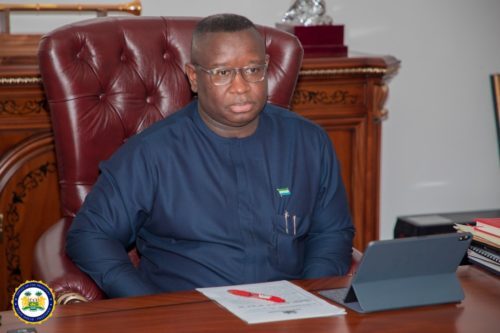By Amin Kef Sesay
No doubt, President Bio and his New Direction Government since coming to power in April 2018 have made quite significant development gains across the board; not least in the areas of administrative and public financial management, the fight against corruption; increased revenue generation and a host of other infrastructural and human development achievements that the President outlined to MPs and the nation last week in Parliament.
Remembering that the development of all developing countries fall within the scope of the Sustainable Development Goals, the main challenge that the Government faces is that of robust political commitment to the fundamental challenge of reducing poverty; against which all other achievements pale into insignificance.
Truth is, we are not halfway near putting in place the superstructures needed for addressing poverty on a whole scale – talking about education, health, housing for the poor and low income earners, food, water, electricity, transport, and most important of all jobs for the growing youth population.
Still, we are largely dependent on natural resources to achieve growth and development. As at now, we are virtually not exporting anything, with the economy in the doldrums due to COVID. It is against this background that we should consider that to achieve the SDGs, the biggest challenge is money – money to adequately finance improvements in the above mentioned critical development areas.
On the environmental front, the challenges include the adverse impact of climate change, increasing water scarcity, biodiversity and ecosystem loss, low resilience to natural disasters, energy crisis, food crisis, limited benefits from globalization, health security, the global financial crisis, smuggling, trafficking and piracy, low penetration of ICT services, urbanization, need to develop better disaster response mechanisms, food security and technology transfer among others.
As we continue to lose our forests rapidly to logging, farming and other human activities without any concerted effort to replace them, we tend to forget how this relates dangerously to climate change.
Persistent loss of biodiversity is also a major problem that we have to urgently attend to going forward as we continue to practice slash and burn farming and clearing of forests for charcoal and firewood which are the primary causes of loss of biodiversity and major sources of climate change.
Persistently high food prices remain a problem. Addressing biodiversity loss requires long-term solutions in the form of development and implementation of appropriate policy guidelines, institutional capacity-building and deployment of adequate resources.
Improve water management and storage capacity to ensure continued supply of water for domestic and economic purposes and for ecosystem balance is another major challenge we face.
In a nutshell, we are still severely constrained in our development strides by very low agricultural productivity, insanitary living conditions, poor access to electricity, halving extreme poverty, reducing hunger, reducing child and maternal mortality, promoting gender equality and reducing deforestation.
However, interestingly, these challenges provide opportunities amongst which is potential growth in the context of a green economy particularly with the vast and largely untapped natural resources.
A shift in development planning in adapting to and mitigating climate change also presents opportunities with access to additional resources.
To maintain the momentum in the implementation of sustainable development programs, it is necessary to:
- Mobilize and increase the effective use of available financial resources and achieve the national and international economic conditions needed to fulfill internationally agreed development goals;
- Explore ways of generating new public and private innovative sources of finance for development purposes that provide quick wins;
- Promote, facilitate and finance appropriate access to and the development, transfer and diffusion of environmentally sound technologies;
- Use information and communication technologies, where appropriate, as tools to increase the frequency of communication and the sharing of experience and knowledge;
- Continue to focus on education as critical for promoting sustainable development;
- Enhance and accelerate human, institutional and infrastructure capacity-building initiatives, and promote partnerships that respond to specific development needs;
- Remove resource constraints, enhance inter-departmental coordination, improve the capacity for implementing and monitoring national policies; and
- Complement existing coordination at a high level, with sufficient opportunities for the coordination of implementation mechanisms at the Councils’ levels.
Lastly, the development agenda needs to be more focused and better harmonized, especially where there are limited resources for implementation.




